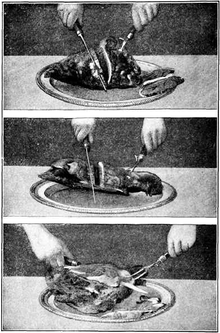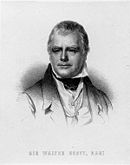- Cold shoulder
-
"Cold shoulder" is a phrase used to express dismissal or the act of disregarding someone. Its origin is attributed to both 19th-century literary works and as a result of folk etymology.
Contents
Early use
Although the exact origin is disputed, the first occurrence of the phrase "cold shoulder" appearing in print is in a Scottish dialect, from The Antiquary by Sir Walter Scott in 1816:[1]
"Ye may mind that the Countess’s dislike did na gang farther at first than just shewing o’ the cauld shouther—at least it wasna seen fartha; but at the lang run it brak out into such downright violence that Miss Neville was even fain to seek refuge at Knockwinnock castle with Sir Arthur's leddy, wha (God sain her) was then wi' the living."[2]where "cauld" is the equivalent of cold and "shouther" means shoulder,[3] which is further supported by contextual usage in The Antiquary. Neither eating nor food is expressed in the passage, but the phrase is presented in a rather allusive way.[1] The phrase also appears in one of Scott's later works, St. Ronan's Well and after the 1820s it had traveled to America. Dated June 1839 in a letter to the editor in the New England newspaper The Bangor Daily Whig and Courier:
"... eminent individuals and his cabinet advisers turned "the cold shoulder" to their ambassador, for his independent act upon this occasion."[1]Another explanation is that the phrase stems from a particular way to serve food to an unwanted guest.[4] In this case, "cold shoulder" refers to serving of an inferior cut of meat, namely a "cold shoulder of mutton"[5][6][7][8] to an uninvited guest, as opposed to serving a hot meal or roast that was fresh out of the oven to an invitee,[4] which was customary at the time.[8] This acted as both a direct and subtle means to let the guest know that he was or had become unwelcome, and had extended his stay.[8]
Yet, a different source claims that explanations other than a fairly simple one may be the outgrowth of a very literal action: keeping one's back towards, or in the least a shoulder between, a person one was trying to avoid.[8]
One source contests that with the earliest citations coming from Sir Walter Scott, who also coined several other phrases, and not being in context with any food, that the attribution of the phrase coming from the serving of cold mutton shoulders is a matter of folk etymology, and that the source originates with Scott himself.[1]
Modern day usage
Regardless of a definitive etymology, the phrase "cold shoulder" has been used in many literary works, and has entered into the vernacular. It has been used as a description of aloofness and disdain,[1] a contemptuous look over one's shoulder,[4] and even in the context of a woman attempting to decline the advances of an aggressive man.[6] Overall, it remains widely popular as a phrase for describing the act of ignoring someone or something, or giving an unfriendly response.[5]
See also
- A phrase also coined by Sir Walter Scott, "lock, stock, and barrel".
- Scottish English
References
- ^ a b c d e Martin, Gary. "Cold shoulder". The Phrase Finder. Gary Martin. http://www.phrases.org.uk/meanings/cold-shoulder.html. Retrieved 25 October 2010.
- ^ Scott, p. 69.
- ^ Jamieson, p. 475.
- ^ a b c Hodgson, p. 153.
- ^ a b Helterbran,p. 22.
- ^ a b Palmatier, p. 73.
- ^ The Nation, p. 207.
- ^ a b c d Eliot, p. 33.
Sources
- Eliot, Sonny; Hill, Draper; Williams, Stanley D. (2007). Sonny Sez!: Legends, Yarns, and Downright Truths. Wayne State University Press. pp. 180. ISBN 0814333354.
- Helterbran, Valeri R. (2008). Exploring Idioms: A Critical-Thinking Resource for Grades 4-8. Maupin House Publishing, Inc. pp. 133. ISBN 1934338141.
- Hodgson, Charles (2007). Carnal Knowledge: A Navel Gazer's Dictionary of Anatomy, Etymology, and Trivia. Macmillan. pp. 272. ISBN 312371217.
- Jamieson, John; Johnstone, John; Longmuir, John (1867). Jamieson's Dictionary of the Scottish language (Edinburgh, W. P. Nimmo): 635. OCLC 70431433.
- The Nation (Joseph H. Richards) 69. 1899. ISSN 0027-8378. OCLC 1643268.
- Palmatier, Robert Allen (2000). Food: a dictionary of literal and nonliteral terms. Greenwood Publishing Group. pp. 461. ISBN 0313314365.
- Scott, Sir Walter (1816). The works of Sir Walter Scott. 3, The antiquary. James Ballantyne and Co. for Archibald Constable and Co. Edinburgh; and Longman, Hurst, Rees, Orme, and Brown, London. pp. 370. OCLC 310724884.
Categories:
Wikimedia Foundation. 2010.


